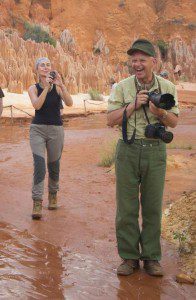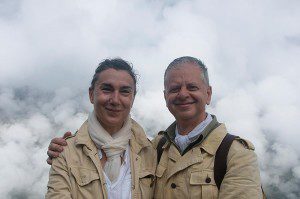 Amphibians the world over are facing probably the world’s most serious extinction crisis. What are your thoughts on the future prospects for amphibian conservation and preventing further extinctions?
Amphibians the world over are facing probably the world’s most serious extinction crisis. What are your thoughts on the future prospects for amphibian conservation and preventing further extinctions?
Extinctions are part and parcel of the natural process and have always taken place in this planet’s long history, but what we are seeing in our time is – for possibly the second time after the Pleistocene – an enormous number of species being wiped off the face of the Earth uniquely through human intervention and responsibility. I am convinced the current fungal epidemics which are endangering a number of amphibian populations worldwide have somewhat been triggered by human industrial activity, so if on one side I am quite pessimistic about the endangered status of so many – not only amphibian – species, on the other I can only hope captive reproduction by reputable zoos and researchers will somewhat delay the final crisis. Captive breeding however will be absolutely useless if the general public and the industry’s mindset towards the environment, towards natural habitats, won’t change. There’s no use in rehabilitating baby orangutans if there’s no rainforest left for them to live in because some oil palm company burned it down, if you see my point. The mindless consumerism by the Western world has to change for good and forever if something is to change.
What do you think are some of the most promising developments in the fight to prevent further amphibian population declines?
Like with so many other species – from tigers to rhinos – education of the younger generations is paramount. Ignorance is the bane of conservation. Lab and field research are important and require funding, and so does the setting apart of nature reserves and protected areas, but all this comes only through enlightment – an educated, well-informed, vocal public opinion can still work wonders. The general public has to realize once and forever that all life forms are interconnected, that all life has to be conserved for future generations – or even simply for the sake of it. It’s time to stop being spoiled, violent kids – humanity has to grow up.
 Why did you join the Alliance and what is you are doing to help protect amphibians?
Why did you join the Alliance and what is you are doing to help protect amphibians?
As I said above, education is in our opinion the single most important factor in conservation. That, and the economical involvement of local communities when a National Park or another protected area are set up. To save animals we need people to know about them and – somewhat cynically – to realize some of them are worth more to them alive than dead. Elephants, tigers, sharks, whales, dolphins, snakes, frogs – you name it…All these need a lebensraum and the money needed for it to be able to survive and flourish. Western – especially European – countries won’t provide the funding to help Third World countries to preserve their remaining untouched environment, so another way must be found, and that is responsible tourism. And people – highly motivated travellers – can provide a huge chunk of it. Anima Mundi – Adventures in Wildlife Photography exists only for this specific reason – to share information, to freely disseminate and nurture a conservation mindset worldwide, at no cost whatsoever. Antonella and I actively document and promote wildlife photography travelling and ecotourism to worthy destinations, we support conservation-oriented lodges and local operators, we strongly promote research projects – from Dante Fenolio’s work with Darwin’s frogs in Chile to field research on European adders (we have a soft spot for the underdogs – those species most people don’t usually care about). We are proud to have among our contributors respected researchers such as Dante or Piotr Naskrecki, and being able to work with conservation organizations such as the ASA and the San Antonio and Dallas Zoos. It’s a big job putting it together – I do the desk job all by myself, from taking the photographs to the layout to the pdf – but the final product is and will always be completely free to all. And with more than 30,000 downloads per issue worldwide, many from developing countries and from younger readers, it’s working. We are sharing the beauty of nature, of the wilderness, of rare and endangered animals large and small with all our readers – at no cost.
What can the average person, as well as the private sector, do in order to tangibly and actively participate in amphibian conservation?
Be aware, be informed, be ready to make personal choices and be aware that a little step in the right direction can change the world. And even if the war is lost – and it may very well be, alas – be willing to go down fighting, to the last. That’s what culture is for.
By Andrea Ferrari
To learn more about how Anima Mundi – Adventures in Wildlife Photography is working with the Amphibian Survival Alliance please visit their profile here.
